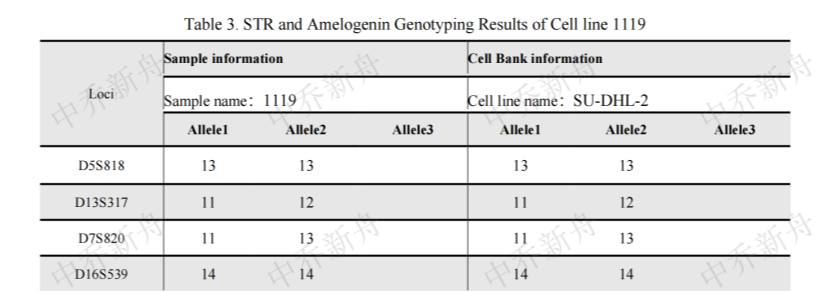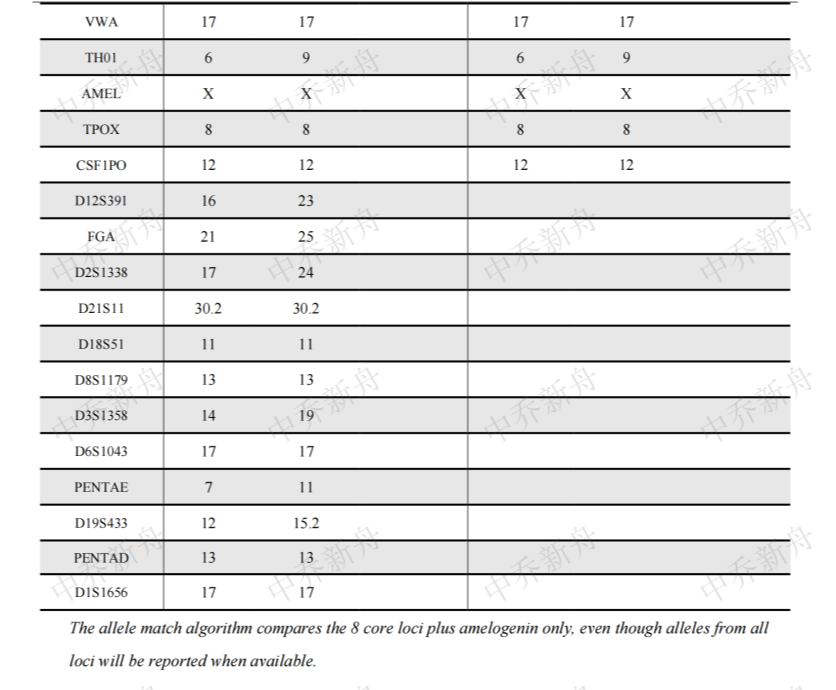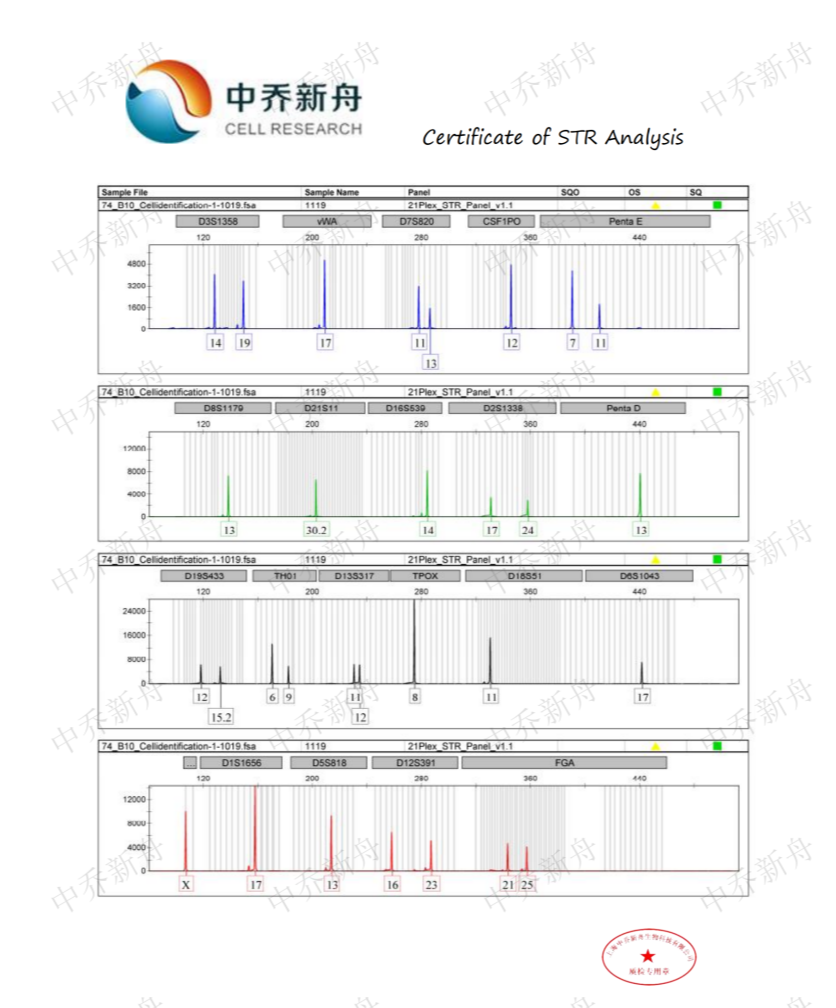
|
产品名称 |
SU-DHL-2人弥漫性组织淋巴瘤细胞 |
|
货号 |
ZQ0837 |
|
产品介绍 |
SU-DHL-2 是一种组织细胞系,于 1974 年从一名患有大细胞淋巴瘤的 73 岁白人女性的淋巴结中分离出来。该细胞系被广泛用于癌症研究,包括药物筛选、基因表达研究、细胞信号传导研究等。用于研究弥漫性大B细胞淋巴瘤的发病机制、治疗方法、药物敏感性等。 |
|
种属 |
人 |
|
性别/年龄 |
女/73岁 |
|
组织 |
淋巴结 |
|
疾病 |
大细胞淋巴瘤 |
|
细胞类型 |
组织细胞 |
|
形态学 |
淋巴母细胞样 |
|
生长方式 |
悬浮;多细胞聚集体 |
|
倍增时间 |
~24 hours (DSMZ=ACC-902) |
|
培养基和添加剂 |
RPMI-1640(品牌:中乔新舟 货号:ZQ-200)+10%胎牛血清(中乔新舟 货号:ZQ0500)+1%P/S(中乔新舟 货号:CSP006) |
|
推荐完全培养基货号 |
|
|
生物安全等级 |
BSL-1 |
|
培养条件 |
95%空气,5%二氧化碳;37℃ |
|
STR位点信息 |
Amelogenin: X
D5S818: 13 |
|
抗原表达/受体表达 |
*** |
|
基因表达 |
*** |
|
保藏机构 |
ATCC; CRL-2956;DSMZ; ACC-902 |
|
供应限制 |
仅供科研使用 |
|
货号 |
ZQ0837 |
|
发货规格 |
活细胞:T25培养瓶*1瓶或者1ml 冻存管*2支(细胞量约为1x10^6 Cells/Vial)二选一 |
|
发货形式 |
活细胞:常温运输;冻存管:干冰运输 |
|
储存温度 |
活细胞:培养箱;冻存管:液氮罐 |
|
产地 |
中国 |
|
供应限制 |
仅供科研使用 |
PubMed=4140017; DOI=10.1002/1097-0142(197412)34:6<1851::AID-CNCR2820340602>3.0.CO;2-4
Epstein A.L., Kaplan H.S.
Biology of the human malignant lymphomas. I. Establishment in continuous cell culture and heterotransplantation of diffuse histiocytic lymphomas.
Cancer 34:1851-1872(1974)
PubMed=214220; DOI=10.1002/1097-0142(197811)42:5<2379::AID-CNCR2820420539>3.0.CO;2-4
Epstein A.L., Levy R., Kim H., Henle W., Henle G., Kaplan H.S.
Biology of the human malignant lymphomas. IV. Functional characterization of ten diffuse histiocytic lymphoma cell lines.
Cancer 42:2379-2391(1978)
PubMed=83902; DOI=10.1002/1097-0142(197901)43:1<1::AID-CNCR2820430102>3.0.CO;2-M
Kaplan H.S., Goodenow R.S., Gartner S., Bieber M.M.
Biology and virology of the human malignant lymphomas: 1st Milford D Schulz Lecture.
Cancer 43:1-24(1979)
PubMed=371794
Epstein A.L., Kaplan H.S.
Feeder layer and nutritional requirements for the establishment and cloning of human malignant lymphoma cell lines.
Cancer Res. 39:1748-1759(1979)
PubMed=3881165; DOI=10.1016/0165-4608(85)90186-4
Kaiser-McCaw Hecht B., Epstein A.L., Berger C.S., Kaplan H.S., Hecht F.
Histiocytic lymphoma cell lines: immunologic and cytogenetic studies.
Cancer Genet. Cytogenet. 14:205-218(1985)
PubMed=8547074; DOI=10.1111/j.1365-2141.1995.tb05302.x
Siebert R., Willers C.P., Schramm A., Fossa A., Dresen I.M.G., Uppenkamp M., Nowrousian M.R., Seeber S., Opalka B.
Homozygous loss of the MTS1/p16 and MTS2/p15 genes in lymphoma and lymphoblastic leukaemia cell lines.
Br. J. Haematol. 91:350-354(1995)
PubMed=15356658; DOI=10.1038/sj.leu.2403465
Drexler H.G., MacLeod R.A.F.
Malignant hematopoietic cell lines: in vitro models for the study of anaplastic large-cell lymphoma.
Leukemia 18:1569-1571(2004)
PubMed=21179087; DOI=10.1038/nature09671
Ngo V.N., Young R.M., Schmitz R., Jhavar S., Xiao W.-M., Lim K.-H., Kohlhammer H., Xu W.-H., Yang Y.-D., Zhao H., Shaffer A.L. III, Romesser P., Wright G., Powell J.I., Rosenwald A., Muller-Hermelink H.-K., Ott G., Gascoyne R.D., Connors J.M., Rimsza L.M., Campo E., Jaffe E.S., Delabie J., Smeland E.B., Fisher R.I., Braziel R.M., Tubbs R.R., Cook J.R., Weisenburger D.D., Chan W.C., Staudt L.M.
Oncogenically active MYD88 mutations in human lymphoma.
Nature 470:115-119(2011)



 上海中乔新舟生物科技有限公司
上海中乔新舟生物科技有限公司